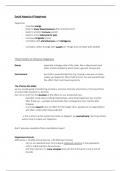Social Aspects of Happiness
Happiness
- provides energy
- leads to lower blood pressure after stressful event
- leads to a better immune system
- leads to more tolerance for pain
- increases longevity (nuns)
- correlates with attractiveness and intelligence
- correlates rather strongly with wealth (or: things that correlate with wealth)
Three Factors to influence Happiness
Genes especially unhappy side of the scale, like in depression (and
other mental problems) which have a genetic component
Environment we tend to overestimate this (e.g. buying a new pair of shoes
makes you happy for about half an hour, but we overestimate
the effect that it will have long-term)
The Choices We Make
we are usually good at predicting emotions, and also intensity of emotions, that result from
an action (like vacation vs. dentist)
but not so much for the duration of the effect on our emotional lives
- example: study about ending relationships; estimating happiness two months
after break-up ® people overestimate their unhappiness two months after
breakup
- it actually doesn’t have an effect for the longer term, people are as happy before
and after, unlike what they predicted
® this is also true for events that make us happier! we overestimate how long certain
events truly increase our happiness
don’t assume causation from correlation! ever!
Happiness-Formula:
40% Genes + 10-20% Circumstances + 40-50% Own Choices
- not on an individual level, this is about explained variance in the population
- only in stable western democracies
- and they interact, it’s more complex than just this formula (it’s only a rule of
thumb)
,Loneliness is the best predictor of Unhappiness (really stood out in Covid research, but
also generally)
® most things that we write down that made us happy are something social, not something
we did alone
® number of friends highest correlation with happiness (also but less: education level,
intelligence, attractive, income)
exclusion from a group causes much distress to a person –
social pain and physical pain light up the same brain regions!
Three stages (Exclusion)
® pain
® pressure on fundamental needs such as the need to belong, autonomy, and self-
worth
® repairing: do something to establish affiliation, or do something you are good at
(excelling to bring back self-worth)
from an evolutionary perspective in nature: exclusion is basically a death sentence
(if you’re not part of a herd anymore, you’re much more likely to be eaten by a lion.)
The Social Cortex
® Dunbar 1998: as brain size of an animal increases, so does group size
® the bigger the group you’re in, the more power you need to navigate/negotiate your
social environment (negotiating bonds and relationships, different emotions)
,Groups that we are part of:
5: immediate family, best friend(s), complete trust
15: family, friend groups, work, sportsteam
150: people you know
500: including vague acquaintances
1500: matching name/face
® Different now with social media?
we spend 20% of our time socially; 60% of this time we spend with the immediate 5
laugh, dance, exercise, music, synchrony ® are the things that affect us in the most positive
way
Epley & Schroeder Study 2014 ® Chicago Train Thingy
- commuters were approached on the platform and were asked to either (a) talk to
a fellow passenger, (b) refrain from talking to a fellow passenger, or (c) nothing as
a control condition
- all received an envelope with a questionnaire to fill in and send afterwards
containing a question about their happiness
- people who had a conversation reported being significantly happier:
- but we actually expect the opposite for some reason:
, Prosocial spending (spending money for other people) makes us happier also if you
control for income
Study: you are given 20 euros and you are asked to either (1) buy something for yourself or
to (2) buy something for a good friend
contacted in the evening and asked how happy they are
other people were asked to estimate which group would be happier
® assume that people who buy something for themselves would be happier, but that is not
actually the case ® it is the opposite way around
(this was in the lecture, but is also literature material: Aknin, Dunn, & Whillans (2022))
The gathering around the Ganges ® religious festival where 80-100 million people are
bathing in the Ganges and another river for one month and camp there and everything
What does this do to people? ® researcher predicted that people will be sicker and less
happy but actually again, the opposite is true
if you are part of a human gathering, something that is bigger than yourself, has a
profound effect on happiness
also music festivals, something where people feel belonging and shared identity
® effects last a long time: anticipated happiness, and happiness also stays for quite a while
afterwards
(assumption of the researchers: because people became
happier, they also became healthier)
Trust makes you happier ® countries are happier when there is greater trust in civic
honesty and also political institutions (legal system, police, politicians)
trust in others is a very big predictor of happiness!





